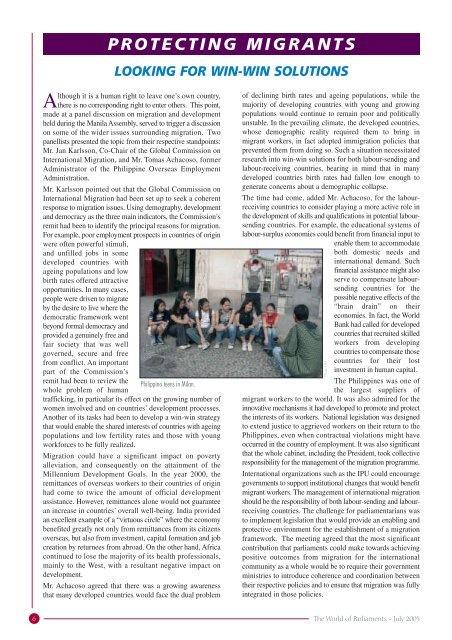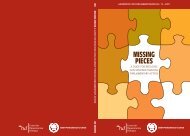PDF 631 Kb - Inter-Parliamentary Union
PDF 631 Kb - Inter-Parliamentary Union
PDF 631 Kb - Inter-Parliamentary Union
Create successful ePaper yourself
Turn your PDF publications into a flip-book with our unique Google optimized e-Paper software.
Although it is a human right to leave one’s own country,<br />
there is no corresponding right to enter others. This point,<br />
made at a panel discussion on migration and development<br />
held during the Manila Assembly, served to trigger a discussion<br />
on some of the wider issues surrounding migration. Two<br />
panellists presented the topic from their respective standpoints:<br />
Mr. Jan Karlsson, Co-Chair of the Global Commission on<br />
<strong>Inter</strong>national Migration, and Mr. Tomas Achacoso, former<br />
Administrator of the Philippine Overseas Employment<br />
Administration.<br />
Mr. Karlsson pointed out that the Global Commission on<br />
<strong>Inter</strong>national Migration had been set up to seek a coherent<br />
response to migration issues. Using demography, development<br />
and democracy as the three main indicators, the Commission’s<br />
remit had been to identify the principal reasons for migration.<br />
For example, poor employment prospects in countries of origin<br />
were often powerful stimuli,<br />
and unfilled jobs in some<br />
developed countries with<br />
ageing populations and low<br />
birth rates offered attractive<br />
opportunities. In many cases,<br />
people were driven to migrate<br />
by the desire to live where the<br />
democratic framework went<br />
beyond formal democracy and<br />
provided a genuinely free and<br />
fair society that was well<br />
governed, secure and free<br />
from conflict. An important<br />
part of the Commission’s<br />
remit had been to review the<br />
whole problem of human<br />
PROTECTING MIGRANTS<br />
LOOKING FOR WIN-WIN SOLUTIONS<br />
Philippino teens in Milan.<br />
trafficking, in particular its effect on the growing number of<br />
women involved and on countries’ development processes.<br />
Another of its tasks had been to develop a win-win strategy<br />
that would enable the shared interests of countries with ageing<br />
populations and low fertility rates and those with young<br />
workforces to be fully realized.<br />
Migration could have a significant impact on poverty<br />
alleviation, and consequently on the attainment of the<br />
Millennium Development Goals. In the year 2000, the<br />
remittances of overseas workers to their countries of origin<br />
had come to twice the amount of official development<br />
assistance. However, remittances alone would not guarantee<br />
an increase in countries’ overall well-being. India provided<br />
an excellent example of a “virtuous circle” where the economy<br />
benefited greatly not only from remittances from its citizens<br />
overseas, but also from investment, capital formation and job<br />
creation by returnees from abroad. On the other hand, Africa<br />
continued to lose the majority of its health professionals,<br />
mainly to the West, with a resultant negative impact on<br />
development.<br />
Mr. Achacoso agreed that there was a growing awareness<br />
that many developed countries would face the dual problem<br />
of declining birth rates and ageing populations, while the<br />
majority of developing countries with young and growing<br />
populations would continue to remain poor and politically<br />
unstable. In the prevailing climate, the developed countries,<br />
whose demographic reality required them to bring in<br />
migrant workers, in fact adopted immigration policies that<br />
prevented them from doing so. Such a situation necessitated<br />
research into win-win solutions for both labour-sending and<br />
labour-receiving countries, bearing in mind that in many<br />
developed countries birth rates had fallen low enough to<br />
generate concerns about a demographic collapse.<br />
The time had come, added Mr. Achacoso, for the labourreceiving<br />
countries to consider playing a more active role in<br />
the development of skills and qualifications in potential laboursending<br />
countries. For example, the educational systems of<br />
labour-surplus economies could benefit from financial input to<br />
enable them to accommodate<br />
both domestic needs and<br />
international demand. Such<br />
financial assistance might also<br />
serve to compensate laboursending<br />
countries for the<br />
possible negative effects of the<br />
“brain drain” on their<br />
economies. In fact, the World<br />
Bank had called for developed<br />
countries that recruited skilled<br />
workers from developing<br />
countries to compensate those<br />
countries for their lost<br />
investment in human capital.<br />
The Philippines was one of<br />
the largest suppliers of<br />
migrant workers to the world. It was also admired for the<br />
innovative mechanisms it had developed to promote and protect<br />
the interests of its workers. National legislation was designed<br />
to extend justice to aggrieved workers on their return to the<br />
Philippines, even when contractual violations might have<br />
occurred in the country of employment. It was also significant<br />
that the whole cabinet, including the President, took collective<br />
responsibility for the management of the migration programme.<br />
<strong>Inter</strong>national organizations such as the IPU could encourage<br />
governments to support institutional changes that would benefit<br />
migrant workers. The management of international migration<br />
should be the responsibility of both labour-sending and labourreceiving<br />
countries. The challenge for parliamentarians was<br />
to implement legislation that would provide an enabling and<br />
protective environment for the establishment of a migration<br />
framework. The meeting agreed that the most significant<br />
contribution that parliaments could make towards achieving<br />
positive outcomes from migration for the international<br />
community as a whole would be to require their government<br />
ministries to introduce coherence and coordination between<br />
their respective policies and to ensure that migration was fully<br />
integrated in those policies.<br />
Photo IOM.<br />
6 The World of Parliaments - July 2005
















